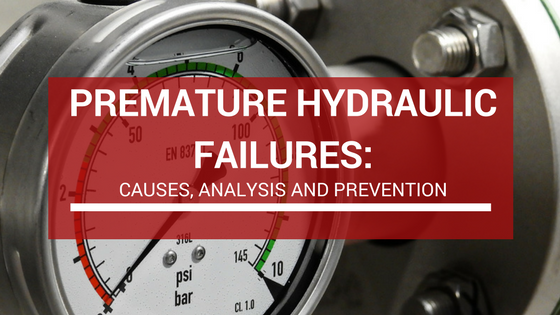Premature Hydraulic Failures: Causes, Analysis and Prevention
Hydraulic components are expensive, and it can be incredibly inefficient to replace them more than you have to. According to industry sources, up to 90% of premature failures can be avoided.
Premature failure may simply be defined as the failure of a component before it reaches its expected service life and the service life of individual components varies and is influenced by several factors.
Causes
The following circumstances will have a negative impact on the service life of hydraulic components and can lead to a premature failure.
Insufficient fluid level
Low fluid levels in a hydraulic reservoir may result in increased contamination, higher temperatures, and poor oil lubrication.
Contamination
Contamination of the hydraulic fluid may occur due to air, water, solid particles, or any other foreign matter.
- Air contamination can damage the system through loss of lubrication, overheating, and oxidation of seals.
- Water contamination can damage the system components through cavitation and altered fluid viscosity.
- Contamination from solid particles can cause abrasive wear.
Filters that are clogged will stop holding any dirt particles and decrease the life of each component in the hydraulic unit.
Incorrect system design
Incorrectly sized, installed, or adjusted components can create excessive heat and noise, leading to valve wear and oil breakdown.
Fluid leakage
Anywhere oil escapes from a system, air or other contamination can enter. This may lead to low fluid levels, air in the hydraulic system, and other issues will arise.
Wrong fluid type or viscosity
the effectiveness of the system will depend upon whether it is running at the correct parameters; a very high fluid viscosity can cause cavitation, while low fluid viscosity can result in inadequate lubrication of components.
Excessive temperatures
Overheating is the single most effective way of damaging the hydraulic oil and system components by lowering oil performance and reducing lubrication.
Component wear Other factors that have an impact on component service life include the type of component, circuit design, operating load, duty cycle, and working conditions.
Types Of Wear
Accurate failure analysis of many kinds of wear or conditional issues is crucial to eliminating potential and future problems.
- Abrasive wear is the scuffing and scoring of a surface in the hydraulic system.
- Adhesive wear occurs when two surfaces begin to scuff and start to adhere to each other resulting in the transfer of metal from one surface to the other.
- Fatigue wear occurs in heavily loaded lubricated contacts causing deformation and surface cracking.
- Erosive wear occurs when contaminated fluid moves past surfaces at high speed and erodes them.
- Cavitation wear occurs when oil-vapour bubbles form then collapse under pressure, which is powerful enough to erode
- Corrosive wear occurs when chemical reaction results in loss of surface material.
Conducting Failure Analysis
When premature failure does occur, a thorough investigation should be performed to understand the cause of the failure.
This is essential to prevent the re-occurrence of the same issue with the replacement.Failure analysis is an important proactive measure and a necessary element of any preventative maintenance program.
Conducting failure analysis is a specialised task that requires a wealth of understanding and experience with the construction of hydraulic circuits.Consult a hydraulic specialist if necessary.
Maintenance Or Design
If the failed hydraulic component under analysis is an OEM manufactured part the cause of failure is often blamed on the way it was installed and the conditions it operated in.
If the hydraulic component is a rebuilt component, the quality of the rebuild is also considered. Any warranty claim based on parts can be void if any of the following are deemed to have caused the component to fail:
- Incorrect storage or handling
- Incorrect operating and start-up procedures
- Contaminated oil
- Improper oil viscosity
- Damage caused by incorrect adjustment or other faulty components
Smart hydraulic component suppliers can advise their customers of the potential pitfalls that can cause premature failure to overcome the vicious circle of failure and repair.
Preventative Maintenance
Proactive maintenance emphasises the routine detection and correction of root cause conditions that would otherwise lead to equipment failure which is especially necessary with hydraulic products.
Good reasons to begin a preventive maintenance program include avoiding costly emergency
repairs, production downtime and increasing worker safety. Three readily detectable symptoms that give early warning of root cause conditions are; abnormal noise, high fluid temperature and slow operation.
Hydraulic systems can certainly have a longer service life if they are managed in a correct and preventive manner.
Preventative hydraulic maintenance includes:
- Maintaining hydraulic fluid cleanliness, temperature and viscosity
- Maintaining hydraulic systems settings
- Scheduling component change-outs before failure
- Following correct commissioning procedures
- Conduct routine failure analysis
There are several factors which influence how often you need to inspect your equipment including the critical nature of the equipment, operating temperatures and pressures, environmental factors, type of usage, and accessibility of equipment.
Conclusion
Despite all our best efforts to practice proper preventive and proactive maintenance, premature component failures still occur.The most critical factors which ensure the reliability of hydraulic components and systems include:
- Proactive rather than reactive maintenance
- Using checklists prevent maintenance procedure failures
- Following fundamental best practices
- Speaking to and utilising specialists
Take all reasonable steps to ensure you do everything you possibly can to avoid premature failures proactively.
Need help maintaining or rebuilding your hydraulic components? Contact the experts at MMS.


